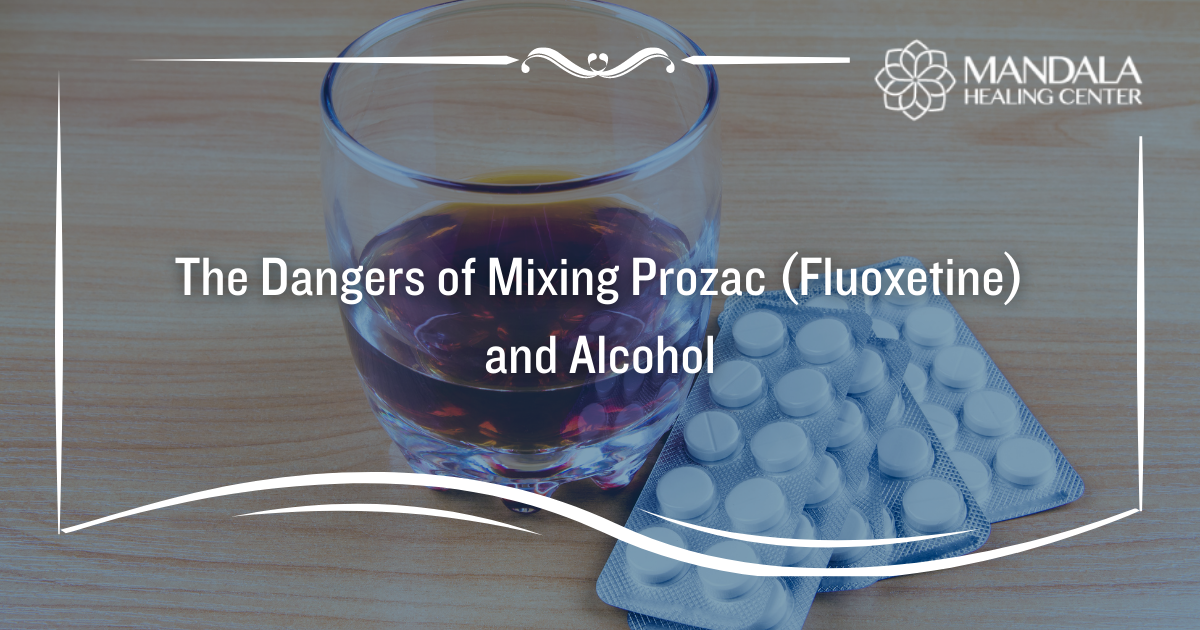Depression is one of the most common mental illnesses in the United States and the rest of the world. According to the World Health Organization (WHO), “Approximately 280 million people in the world have depression.”[1] While depression is common, it can significantly impact your ability to function in your daily life.
The symptoms of depression can be difficult to cope with, but one of the most popular ways to manage them is with antidepressant medications. One of the most commonly prescribed antidepressant medications is known as Prozac (fluoxetine). Not only can Prozac treat depression, but it is known to provide relief for other conditions like obsessive-compulsive disorder, a variety of eating disorders, and different types of anxiety conditions.[2]
While Prozac is a non-habit-forming medication that is generally safe to take, there are some risks you should be aware of. Prozac should never be mixed with alcohol because alcohol can increase the side effects of the medication and reduce its effectiveness.
The Side Effects of Prozac (Fluoxetine)
Prozac (fluoxetine) is an antidepressant medication belonging to the selective serotonin reuptake inhibitor (SSRI) class of drugs. SSRIs work by changing the way your brain processes serotonin, a chemical responsible for happiness and mood stabilization.[3] By increasing serotonin levels, Prozac can lessen the symptoms of your depression.
Fluoxetine is widely regarded as one of the most effective and safe treatment options for people suffering from depression and anxiety. However, like any medication, Prozac can cause side effects.
The common side effects of Prozac include:[2]
- Anxiety
- Sleep issues
- Dry mouth
- Loss of appetite and weight loss
- Nausea and vomiting
- Diarrhea
- Sexual dysfunction in males and females
- Unusual dreams
- Heartburn
- Yawning
- Excessive sweating
If you are taking Prozac, the side effects you experience should subside after a few weeks. If you experience side effects that are unmanageable or last longer than a few weeks, contact your doctor to discuss trying a different medication.
Why Would Someone Mix Prozac and Alcohol?
Because drinking is so ingrained in American society, you might not consider the interactions alcohol could have with a medication you take daily. Most people begin mixing their Prozac with alcohol on accident.
While people usually mix alcohol with prescription medications to increase the intoxication they experience, this does not work with SSRIs like fluoxetine. However, you might begin abusing alcohol to self-medicate any lingering symptoms of depression that your Prozac is not treating. Unfortunately, alcohol will not help you manage your symptoms, and drinking excessively can worsen depression in the long term.
Is it Dangerous to Mix Fluoxetine and Alcohol?
While Prozac is a safe and non-habit-forming medication, you should never mix it with alcohol. Doctors always warn their patients not to drink when they are taking SSRIs because this class of drugs does not interact well with alcohol.
Alcohol is a central nervous system depressant, which means it slows down activity in your brain and causes feelings of drowsiness. Some individuals may feel dizzy or drowsy when they take Prozac.[4] As a result, mixing alcohol and fluoxetine could impair motor skills and functioning, putting individuals at risk of bodily injury.
Additionally, other side effects of Prozac might increase if you drink alcohol. Because both Prozac and alcohol can cause nausea, you could experience significant bouts of vomiting that could lead to dehydration. Dehydration can be life-threatening without access to proper medical care.
Lastly, drinking alcohol can lessen the efficacy of your Prozac, which could cause your depression symptoms to come back and increase the risk of suicidal ideations and behaviors.
The Relationship Between Depression and Drinking
The prevalence of depression among individuals suffering from alcoholism is up to 63.8%.[5] Another study found that people diagnosed with depression are 3.7 times more likely to suffer from an alcohol use disorder.[6] This means that people who abuse alcohol have an increased likelihood of co-occurring depressive disorders.
One of the reasons you are more likely to abuse alcohol when you have depression is due to self-medication. If your depression is untreated, you will seek out ways to soothe your symptoms. Alcohol can cause you to experience temporary euphoria, which can be quite addictive for people suffering from low moods and depression.
Another cause of co-occurring depression and alcoholism is genetic factors. Some studies have found that individuals with underlying genetic predispositions to depression also have predispositions to alcohol use disorder.[5]
For these reasons, if you suffer from depression you should be incredibly careful with your alcohol consumption.
Finding Help for Alcohol Abuse and Depression
If you or a loved one suffers from co-occurring alcoholism and depression, dual diagnosis rehab can help. By combining evidence-based mental health treatment with addiction treatment, Mandala Healing Center can provide you with the support and tools you need to maintain long-term recovery.
To learn more about our alcoholism and depression treatment program, contact Mandala Healing Center today.
References:
- https://www.who.int/news-room/fact-sheets/detail/depression
- https://medlineplus.gov/druginfo/meds/a689006.html
- https://www.nhs.uk/mental-health/talking-therapies-medicine-treatments/medicines-and-psychiatry/ssri-antidepressants/overview/
- https://www.nhs.uk/mental-health/talking-therapies-medicine-treatments/medicines-and-psychiatry/antidepressants/considerations/
- https://www.ncbi.nlm.nih.gov/pmc/articles/PMC3658562/
- https://www.ncbi.nlm.nih.gov/pmc/articles/PMC6799954/












